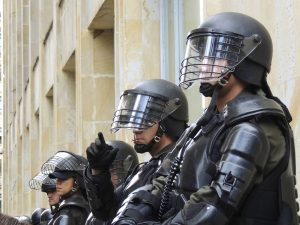There are a number of offences that Police will use where they are faced with a protest, large scale gathering and/or public assembly. The most common offences when dealing with protests are:
Obstructing traffic
A person, without a reasonable excuse (proof of which lies on the accused), cannot prevent the free passage of a person vehicle and/or vessel in a public place such as traffic.
Penalty – 4 Penalty Units
Summary Offences Act 1988. Section 6.
Offensive Conduct
A person must not behave in an offensive manner in or near, within view or hearing from a public place or school.
Penalty – 6 penalty units or imprisonment for 3 months
Summary Offences Act 1988, Section 4.
Laser Pointers
A person must not without a reasonable excuse (proof of which lies on the person) have in his/her possession/custody or use a laser pointer in a public place.
Penalty – 50 penalty units and/or imprisonment for 2 years or both
Summary Offences Act 1988, Section 11FA.
Assault Police and others
A person who assaults, throws a missile at, intimidates a police officer in the execution of his/her duty although no actual bodily harm is occasioned.
Penalty – 5 years imprisonment
Penalty if during an unlawful assembly – 7 years imprisonment
Actual Bodily Harm occasioned – 9 years imprisonment
Previous Bodily Harm occasioned – 12 years (14 years during a public disorder)
Hinder and/or Resisting Police
A person who resists or hinders a police officer in the execution of his/her duty.
If Police attempt to place you under arrest, do not resist or you may be charged with this offence. That being said this offence can be made out with passive resistance such as refusing to unlink your arms.
You must comply with any lawful police direction, often you may know know if the direction is lawful until months later at court if it comes to that.
Penalty – 12 months imprisonment and/or 10 penalty units.
Crimes Act 1900, Section 546C.
Unlawful Assembly
A person who knowingly joins an unlawful assembly or continues in it shall be taken to be a member of that assembly.
An assembly is five or more person whose common objective by means of intimidation or injury is to compel any person to do what something illegal and/or abstain another person from doing what they are legally entitled to do.
Penalty – 6 months imprisonment and/or 5 penalty units.
Crimes Act 1900, section 545C.
Affray
Any person that uses or threatens unlawful violence to another person or whose conduct is such that a person of reasonable firmness present at the scene would be fearful for their safety.
A threat cannot constitute words alone and a person of reasonable firmness need actually to be there.
Penalty – 10 years imprisonment.
Riot
Where 12 or more persons pre
Penalty – 15 years imprisonment.
